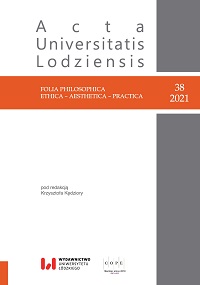Jacques Poulain’s thinking the human and human institutions
DOI:
https://doi.org/10.18778/0208-6107.38.02Keywords:
Human being, pragmatic, philosophical anthropology, globalization, communication, religion, language, institution, Jacques PoulainAbstract
The purpose of this article is to propose a synthesis of Jacques Poulain's philosophical reflection on language and its importance for human being and for the society. To do this, we begin with presenting what Poulain has constantly established in the light of anthropobiological knowledge in his various works by showing that the child does not directly enter the world through senses or action, but through language and that it cannot enter the world and become a subject able to think and act in isolation, but necessarily through the intermediary of a Third of speech. The same goes for the author at the institutional level, since man, as a being of language, has only been able to transform himself indirectly, through the intermediary of this Third of speech, which first took the form of the gods, then by making the detour of the judgment. Today, as Poulain argues in polemic with Jürgen Habermas, there can be no other basis for global communication than transcultural linguistic understanding, ie. language constitutes the space where man can be recognized, exercise judgment and strive for harmony with others.
References
Baril, A. (2013). Penser avec Jacques Poulain, maszynopis, 25 sierpnia 2013. Online https://www.academia.edu/4329066/Penser_avec_Jacques_Poulain [dostęp: 10.08.2021].
Google Scholar
Baril, A. (2017). Penser la mondialisation avec le philosophe Jacques Poulain. L’Albatros, 24 sierpnia 2017. Online https://albatrosmag.com/2017/08/24/penser-la-mondialisation-avec-lephilosophe-jacques-poulain/ [dostęp: 10.08.2021].
Google Scholar
Bolk, L. (1960). La genèse de l’homme. Arguments, 4 (18), s. 3–13.
Google Scholar
Boysson-Bardies, B. de (2005). Comment la parole vient aux enfants. Paryż: Éditions Odile Jacob.
Google Scholar
Cuillerai, M. i Vermeren P. (2018). La privatisation du monde, l’autisme à carapace de la démocratie libérale et de la civilisation, et le destin transculturel de l’homme selon Jacques Poulain. Cahiers critiques de philosophie, 21, s. 201–205.
Google Scholar
Edelman, G. (1992). Biologie de la conscience. Paryż : Éditions Odile Jacob.
Google Scholar
Gehlen, A. (2017). Człowiek: jego natura i stanowisko w świecie. Tłumaczył R. Michalski, J. Rolewski, E. Paczkowska-Łagowska. Toruń: Wydawnictwo Naukowe UMK.
Google Scholar
Gehlen, A. (1959). Urmensch und Spätkultur. Frankfurt: Athenäum Verlag.
Google Scholar
González, W. (2018). L’anthropobiologie philosophique de Jacques Poulain. Cahiers critiques de philosophie, 21, s. 55–70.
Google Scholar
Gualandi, A. (2018). Inhumanités. Anthropobiologie et postmoderne. Cahiers critiques de philosophie, 21, s. 189–199.
Google Scholar
Habermas, J. (1999). Teoria działania komunikacyjnego. Tłumaczył A. M. Kaniowski. T. 1. Warszawa: Wydawnictwo Naukowe PWN.
Google Scholar
Humboldt, W. von (1974). Introduction à l’oeuvre sur le kavi et autres essais. Paryż: Éditions du Seuil.
Google Scholar
Husserl, E. (1999). Kryzys nauk europejskich i fenomenologia transcendentalna. Tłumaczyła S. Walczewska. Toruń: Wydawnictwo Rolewski.
Google Scholar
Leguérinel, L. (2009). Enjeux et limites des théories contemporaines de l’action – De la praxéologie à la pragmatique. Paryż: Éditions L’Harmattan.
Google Scholar
Lévi-Strauss, C. (1962). La pensée sauvage. Paryż: Éditions Plon.
Google Scholar
Lévi-Strauss, C. (1998). Totemizm dzisiaj. Tłumaczyła A. Steinsberg. Warszawa: Wydawnictwo KR.
Google Scholar
Marquard, O. (1981). L’homme accusé et l’homme disculpé dans la philosophie du XVIIIe siècle. Critique, 413, s. 1015–1037.
Google Scholar
Poulain, J. (1973). Logique et Religion. L'Atomisme logique de L. Wittgenstein et la possibilité des propositions religieuses suivi de Logic and Religion. La Haye: Éditions Mouton.
Google Scholar
Poulain, J. (1988). Chamanisme pragmatique, chamanisme psychanalytique. Une thérapie philosophique est-elle possible? Philosophique, 1, s. 83–99.
Google Scholar
Poulain, J. (1991). L’âge pragmatique ou l’expérimentation totale. Paryż: Éditions L’Harmattan.
Google Scholar
Poulain, J. (1993a). La loi de vérité ou la logique philosophique du jugement, Paryż: Éditions Albin Michel.
Google Scholar
Poulain, J. (1993b). La neutralisation du jugement ou la Critique pragmatique de la raison politique. Paryż: Éditions L’Harmattan.
Google Scholar
Poulain, J. (1995). L’activité philosophique devient un élément essentiel de l’expérimentation contemporaine de l’homme, propos recueillis par Roger-Pol Droit, „Le Monde” 26 marca 1995. Online https://www.lemonde.fr/archives/article/1995/03/26/un-entretien-avec-jacquespoulain_3870481_1819218.html [dostęp: 10.08.2021].
Google Scholar
Poulain, J. (2001). De l’Homme. Paryż: Éditions du Cerf.
Google Scholar
Poulain, J. (2006). L’expérimentation philosophique des mondialisations: une réévaluation des rapports du savoir et du pouvoir. W Poulain J., Sandkühler H.-G., Triki F. (red.), L’agir philosophique dans le dialogue transculturel. Paryż: Éditions L’Harmattan, s. 197–212.
Google Scholar
Poulain, J. (2017). Peut-on guérir de la mondialisation? Paryż: Éditions Hermann, 2017.
Google Scholar
Poulain, J., Kretz H. i Agudelo S. (2018). L’humanité comme culture de vérité. Cahiers critiques de philosophie, 21, s. 153–187.
Google Scholar
Schelling, F. W. J. von (2002). Filozofia objawienia. Tłumaczyła K. Krzemieniowa. Warszawa: Wydawnictwo Naukowe PWN.
Google Scholar
Schérer, R. (2018). De l’homme: de l’aliénation à la communication. Cahiers critiques de philosophie, 21, s. 237–243.
Google Scholar
Tomatis, A. (1981). La nuit utérine. Paryż: Éditions Stock.
Google Scholar
Tomatis, A. (1990). L’oreille et la vie. Paryż: Éditions Robert Laffont.
Google Scholar
Uexküll, J. von (1984). Mondes animaux et monde humain. Paryż: Éditions Denoël.
Google Scholar
Downloads
Published
How to Cite
Issue
Section
License

This work is licensed under a Creative Commons Attribution-NonCommercial-NoDerivatives 4.0 International License.












